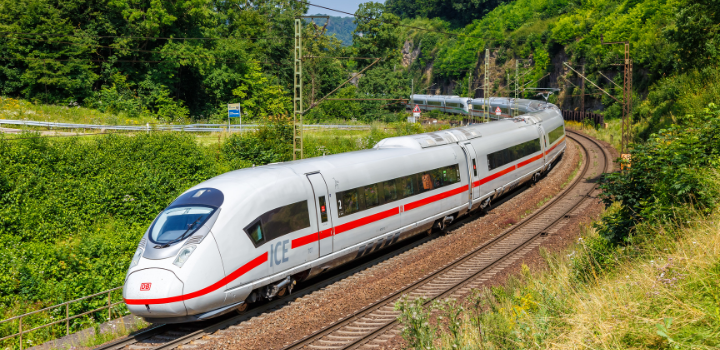This post is by James Beard, a senior associate at the European Climate Foundation.
Greetings from the 10:52 from Stuttgart to Paris. I have decent leg room, a charge point, good Wi-Fi, lovely views. I’m heading home to London from Budapest, where I’ve been meeting with colleagues from across the continent.
My 1,000 mile journey tracks the route of the Orient Express. James Bond rode it in ‘The spy who loved me’ and heroic vampire hunters used it to outsmart Count Dracula. Real world patrons included writers, spies, presidents and kings.
I am none of these things (sadly). My job is reducing aviation emissions. As well as green technology, scientists urge us to fly less to stop airplane pollution heating up the planet.
Train beats plane – for meArriving in Budapest, I was ready for a shower, but I wasn’t stinking, and I felt more energised than exhausted. My colleague, a lighter sleeper, felt differently: “Ok for internal meetings, but maybe not for a conference.”
Perhaps my positivity comes from my upbringing. All my childhood holidays were by land or sea. My dad’s trainspotting and my brother’s model railways gave me a boyish fervour for trains. For me, they made the world both smaller and more fun.
But people are increasingly growing up with air travel, which can get you from London to Budapest in under three hours. If you grew up with that, it must seem wild to spend 24 hours travelling. Fortunately, there’s a solution: Climate Perks.
Not all trains are equalMy journey begins with the Eurostar. Their brand vibes are spot on. You always feel cared for, even when the passport computers and on-board toilets go down. But we still arrived on time, and the faulty toilets were announced before boarding, preventing any scatological unpleasantness. Overall: 4/5.
A French TGV whisked me from Paris to Stuttgart, while a German ICE took me back. The TGV was super comfortable, bang on time. 5/5.
My ICE was equally excellent. But my travel companions both suffered hefty delays for their connecting trains. At one point, of the 16 trains displayed, only four were on time, which is sadly not uncommon for Deutsche Bahn. So overall: 3/5.
Onto the Stuttgart-Budapest sleeper. I loved the sense of adventure and the faded Orient Express glamour. But I can see why others might not.
Bear in mind: unless you pay extra, you’ll share your cabin with up to five strangers. The customer service is functional rather than friendly. The welcome chocolate is nice and the beds are fine, but far from luxurious. The washrooms make it easy to freshen up, but the facilities are basic. Breakfast was a machine coffee and a packet biscuit. The outbound train was on time, but the return was delayed, and woke us up at 4am for a passport check. Can’t see that happening on a plane. Overall: 3/5.
Train or plane?The train is definitely greener. The French TGVs claim to be a whopping 65 times greener than flying. But, although I enjoyed my trip, the customer experience still needs a lot of work.
The biggest issue is actually buying the tickets. Without the Man in Seat 61, I’m not sure I could’ve figured it out. It took two booking platforms and four train companies to get three tickets, all in different formats, some in different languages. Extremely faffy.
My journey was also four-ish hours longer than it should be. If one train is late, there’s no guarantee (yet) that the company running your next train will help you out. More likely you’ll have to buy a new ticket. So lengthy stopovers are essential to make sure you’re not caught out, but they do cause some tedious waiting around.
Lastly, money. I paid £230 each way, which is roughly triple the price of a flight. Fortunately, my company is willing to pay the difference. But can we ask that of regular punters?
What can governments do?With EU elections coming up in June, if you’re able to vote, now is the time to tell politicians you want this fixed.
This would be smart politics. New More in Common research shows 73 per cent of Europeans (across Belgium, France, Germany, the Netherlands, Spain and the UK) want governments to make trains cheaper than planes. Sixty four per cent support this even if it makes flying more expensive, eg by ending tax loopholes for jet fuel, beefing up the EU carbon market, or introducing a Frequent Flyer Levy.
If politicians want to help both people and planet, they need to make taking the train as cheap and easy as the plane. This would be a solid first step towards reducing flights and getting runaway aviation emissions under control. As More in Common’s Ed Hodgson points out:
“Get these basics right, and leaders can use aviation to show how the green transition can be managed more fairly in other industries.”
This is an edited version of this article. The longer version can be found on LinkedIn.
